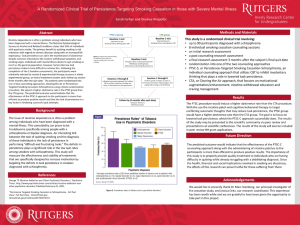Farhan, Sarah: A Randomized Clinical Trial of Persistence Targeting Smoking Cessation in those with Severe Mental Illness
Title: A Randomized Clinical Trial of Persistence Targeting Smoking Cessation in those with Severe Mental Illness
Name: Sarah Farhan
Major: Psychology
School affiliation: School of Arts and Sciences
Programs: Aresty – RA Program
Other contributors: Marc Steinberg, Jessica Ortiz, and Onyinye Nnajiofor
Abstract: Nicotine dependence is often a problem among individuals who have been diagnosed with a mental illness. The National Epidemiological Survey on Alcohol and Related Conditions states that 50% of individuals with psychosis smoke. The primary benefit to quitting smoking is risk reduction with regards to chronic diseases along with an increased life expectancy. Task persistence can aid in the maintenance of abstinence despite common tribulations like nicotine withdrawal symptoms and smoking urges. Individuals with mental illness desire to quit smoking as much as the general population, however, factors like low task persistence make it more difficult to achieve this. Following the completion of the 2 baseline assessments, the participants were arbitrarily selected to receive 8 experimental therapy sessions in either experimental group, an end of treatment session and a follow up session three months after the quit date. The patients were randomized into one of two counseling approaches, Clearing the Air or Persistence-Targeted Smoking Cessation-Schizophrenia using a block randomization procedure. We expect a higher abstinence rate in the PTSC group than the CTA group. The predicted outcome would indicate that the effectiveness of the PTSC-S approach to the participants is more than efficient to produce positive results and that the lack of persistence is a key factor in hindering successful quit attempts.
